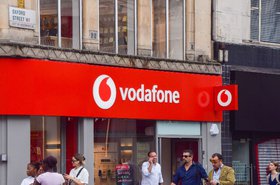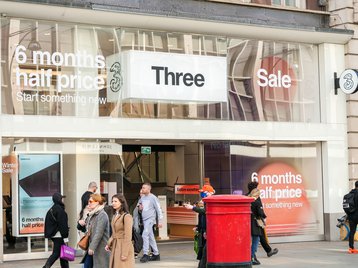The UK's Competition and Markets Authority (CMA) has said it's concerned that Vodafone and Three's proposed merger could lead to mobile customers facing higher prices and reduced service quality.
The CMA gave its opinion on the merger following a 40-day review into the £15 billion ($18.5bn) merger, set to create the UK's biggest telco with more than 27 million customers.
The watchdog said it intends to refer the deal to a more in-depth Phase 2 investigation.
If the deal, which was first announced in October 2022, is given the go-ahead, it will consolidate the UK telco carrier market from four to three, giving consumers less choice, argues the CMA.
The merger will give Vodafone a 51 percent majority stake in the combined entity, currently labeled as "MergeCo," with CK Hutchison's Three holding the remaining 49 percent.
According to CMA, its first investigation found that Vodafone UK and Three UK provide important alternatives for mobile customers, while it noted that Three UK has been the "cheapest of the four mobile network operators."
"The CMA is concerned that combining these two businesses will reduce rivalry between mobile operators to win new customers. Competitive pressure can help to keep prices low, as well as provide an important incentive for network operators to improve their services, including by investing in network quality," the watchdog said in a statement.
Among other concerns, the CMA said any deal could make it tougher for MVNOs (mobile virtual network operators) such as Sky Mobile, Lebara, and Lyca Mobile to negotiate good deals for their own customers, by reducing the number of mobile network operators capable of hosting these ‘virtual networks’.
"Whilst Vodafone and Three have made a number of claims about how their deal is good for competition and investment, the CMA has not seen sufficient evidence to date to back these claims," said Julie Bon, Phase 1 decisionmaker for this case at the CMA.
"Our initial assessment of this deal has identified concerns which could lead to higher prices for customers and lower investment in UK mobile networks. These warrant an in-depth investigation unless Vodafone and Three can come forward with solutions."
Indeed, the CMA has given the duo five working days to respond with meaningful solutions to the CMA. Otherwise, the deal will be referred to a more in-depth Phase 2 investigation.
After agreeing to the merger in June, Vodafone and Three heralded the proposed union as "great for customers, great for the country, and great for competition." However, this has been disputed by the CMA, which said the claims are "based on a number of assumptions about how they will combine and invest in their networks post-merger."
Vodafone and Three welcome Phase 2 probe
In response, both Vodafone and Three have said the calls for a Phase 2 investigation have been expected.
Both telcos 'welcome' a more in-depth investigation.
"By merging our two companies, we will be able to invest £11 billion to help the UK realize its ambitions to be a world leader in next-generation 5G technology, and increase competition across the industry," said Vodafone UK CEO, Ahmed Essam.
"This transaction will create an operator with the scale required to take on BTEE and VMO2, give MVNOs greater choice in the wholesale market, and is in the wider interests of customers, competition, and the country."
"The current market structure is holding the UK back, which is not good for customers or competition. By creating a third player with the necessary scale to invest, the combination of our two companies will deliver one of Europe's most advanced networks and move the UK into the digital fast lane, benefiting customers from Day One," added Three UK CEO, Robert Finnegan.
The CMA didn't note anything about potential job losses as part of the merger.
UK trade union Unite has previously labeled the merger "reckless," and urged the government to intervene. It's said that a deal will lead to job losses to Vodafone and Three UK staff.
Last year, Vodafone announced plans to cut 11,000 jobs worldwide over the next three years.
Kester Mann, director for consumer and connectivity, at CCS Insight, is confident the deal will go ahead.
"My view remains that the deal should be approved. It is better to have three strong providers than two that are dominant and two that are sub-scale. Blocking it could thwart the long-term development of the UK’s telecom infrastructure.
"Vodafone-Three is poised on a regulatory knife-edge, but if both parties are eventually willing to make further concessions – such as divesting assets like mobile spectrum – they should just about get it over the line."








